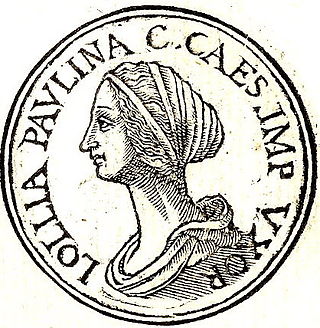Quintus Fabius Ambustus was made dictator of the Roman Republic in 321 BC. He immediately resigned because of some kind of irregularity in his election, whereupon he was replaced by Marcus Aemilius Papus, who was also unable to hold elections, leading to the appointment of Quintus Fabius Maximus Rullianus and Marcus Valerius Corvus as interreges, who successfully oversaw the elections of the consuls for 320 BC.
Quintus Aemilius Papus, a member of the gens Aemilia - an ancient ruling class — of the Papus family, was a Roman general and statesman.
Publius Furius Philus was a consul in 223 BC, a praetor in 216, and a censor in 214. He died the following year, before resigning his office.
The gens Afrania was a plebeian family at Rome, which is first mentioned in the second century BC. The first member of this gens to achieve prominence was Gaius Afranius Stellio, who became praetor in 185 BC.

Aulus Postumius Albus Regillensis was an ancient Roman who, according to Livy, was Roman dictator in 498 or 496 BC, when he conquered the Latins in the great Battle of Lake Regillus and subsequently celebrated a triumph. Many of the coins of the Postumii Albi commemorate this victory of their ancestor, as in the one pictured. Roman folklore related that Castor and Pollux were seen fighting in this battle on the side of the Romans, whence the dictator afterwards promised a temple to Castor and Pollux in the Roman Forum.
Aulus Postumius Albinus was a politician of Ancient Rome, of patrician rank, of the 3rd century BC.
Lucius Postumius Albinus was a politician of ancient Rome, of patrician rank, of the 2nd century BC. He was curule aedile in 161 BC, and exhibited the Ludi Megalenses, at which Terence's play Eunuchus had debuted. He was consul in 154 BC, and died seven days after he had set out from Rome in order to go to his province. It was supposed that he was poisoned by his wife, Publilia.

The gens Cloelia, originally Cluilia, and occasionally written Clouilia or Cloulia, was a patrician family at ancient Rome. The gens was prominent throughout the period of the Republic. The first of the Cloelii to hold the consulship was Quintus Cloelius Siculus, in 498 BC.

The gens Lollia was a plebeian family at Rome. Members of the gens do not appear at Rome until the last century of the Republic. The first of the family to obtain the consulship was Marcus Lollius, in 21 BC.
Spurius Carvilius Maximus Ruga was Roman consul in 234 and 228 BC. Spurius Carvilius Ruga, the schoolteacher, was his freedman.
The gens Herminia was an ancient patrician house at Rome. Members of the gens appear during the first war between the Roman Republic and the Etruscans, circa 508 BC, and from then to 448 BC. Two members of the family held the consulship, Titus Herminius Aquilinus in 506 BC, and Lars Herminius Aquilinus in 448.

Titus Herminius, surnamed Aquilinus, was one of the heroes of the Roman Republic. He participated in two of the most famous conflicts that attended the birth of the Republic, and was elected consul in 506 BC. However, his greatest fame was won as one of the defenders of the Sublician bridge against the army of Lars Porsena, the King of Clusium.
Lars Herminius Aquilinus was consul in 448 BC with Titus Verginius Tricostus Caeliomontanus. Their year of office was relatively peaceful, as neither consul took sides in the conflict between the patricians and the plebeians.

The gens Horatia was a patrician family at ancient Rome. In legend, the gens dates back to the time of Tullus Hostilius, the third King of Rome. One of its members, Marcus Horatius Pulvillus, was consul suffectus in 509 BC, the first year of the Republic, and again in 507. The most famous of the Horatii was his nephew, Publius Horatius Cocles, who held the Sublician bridge against the army of Lars Porsena circa 508 BC.
Amaesia Sentia is mentioned by Valerius Maximus as an instance of a female who pleaded her own cause before the praetor, around 77 BC. She was called "Androgyne", from having a man's spirit with a female form. A crater on asteroid 4 Vesta has been named Sentia after her.
The gens Sextilia was a plebeian family at ancient Rome. The first member of this gens to achieve prominence was Gaius Sextilius, consular tribune in 379 BC. None of the family obtained the consulship, but they endured throughout Roman history from the early Republic into imperial times.
The gens Castricia was a minor plebeian family during the later Republic and under the early Empire. No members of this gens held any important magistracy.
The gens Cotia was a plebeian family at Rome. It is known chiefly from a single individual, Quintus Cotius Achilles. On account of his bravery, he served as the legate of Quintus Caecilius Metellus during his campaign against the Celtiberi in Hispania, 143 BC. He distinguished himself by slaying two of the enemy in single combat.
The gens Domitia was a plebeian family at ancient Rome. The first of the gens to achieve prominence was Gnaeus Domitius Calvinus, consul in 332 BC. His son, Gnaeus Domitius Calvinus Maximus, was consul in 283, and the first plebeian censor. The family produced several distinguished generals, and towards the end of the Republic, the Domitii were looked upon as one of the most illustrious gentes.
The gens Equitia was an obscure plebeian family at ancient Rome, known from only a few individuals. No member of this gens obtained the consulship prior to the third century, but the emperor Probus may have been descended from the Tarquitii.





